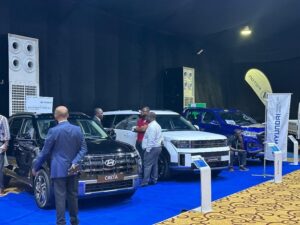By Ernest Bako WUBONTO
Automobile Assemblers Association of Ghana (AAAG) has expressed concerns about the continuous domination of the automotive industry by imported used and salvaged vehicles, as locally assembled new cars account for just 10 percent of the market.
The association revealed at the Automotive Industry Summit, 2025, that over 90 percent of Ghana’s vehicle imports are used and salvaged, raising safety and environmental concerns in an era when climate change is of major concern to every country.
Managing Director of CFAO Mobility Ghana PLC, Adedamola Adelabu, highlighted that Ghana imports nearly 100,000 vehicles annually, with over 90 percent being used cars, many of which are unsafe and contribute to pollution.
This, he stressed, has left the new vehicle market struggling at under 10 percent penetration, stifling investment toward component manufacturing and industrial growth.
Ghana witnessed a notable increase in local vehicle production, in less than five years after the implementation of the policy, with the total number of units reaching over 4,700, representing about 9.6 percent share of the country’s car market.
He further underscored the urgent need to transform the automotive industry by reducing reliance on used vehicle imports and accelerating local manufacturing and sustainable mobility solutions.
“This imbalance is unsustainable as flooding our roads with used vehicles mostly above five years, is a health risk. These aged polluting vehicles undermine road safety, environmental goals, and our economic potential. We must shift to a sustainable, locally anchored automotive future,” he said.
Mr. Adelabu commended the government for the Ghana Automotive Development Policy (GADP) 2019, which has laid the groundwork for local vehicle assembly, industry participation, and market transformation.
Since its implementation six years ago, eight new assembly plants have been established, featuring global brands such as Toyota, Volkswagen, Suzuki, Nissan, Peugeot, Kia, Honda, Hyundai, Sinotruk, Changan, Ashok Leyland, Geely, Foton, and Kantanka.
“These assembly plants are more than manufacturing facilities; they are engines of job creation, skills transfer, and economic diversification,” he emphasised.
Mr. Adelabu stressed that the summit is a clear call to action to build, innovate, walk the talk, and shift the automotive sector to a sustainable and locally anchored future.
“Our vision now extends beyond assembly. We are building the foundation for local component manufacturing, deepening supply chain integration, and preparing for electric mobility,” he added.

The summit serves as a collaborative platform for policymakers, industry leaders, financiers, regulators, and private sector players to align efforts toward a sustainable and locally anchored automotive future.
President of the AAAG, Jeffery Oppong Peprah, elaborated on the significant progress made in the local production of vehicles since the implementation of the GADP in 2019.
He expressed confidence that, with full implementation of the auto policy, these numbers could experience substantial growth by the year 2027.
AAAG has called for the enforcement of a ban on the importation of used and salvaged vehicles older than 10 years, the implementation of a 35 percent import duty on used vehicles aged between one and five years, and the application of the Ghana Standards Authority’s homologation standards to all imported vehicles.
The association argued that such a ban would not only incentivise the purchase of locally produced vehicles but would also drive investment and job creation within the sector.
In response to these appeals, Chief of Staff, Julius Debrah, representing President, John Dramani Mahama, expressed the government’s commitment to creating a supportive environment for the automotive industry by implementing the needed policies and providing additional incentives.
He encouraged assemblers to seize incentive offers that the government will be offering to broaden their vision beyond Ghana and capitalise on opportunities within the West African sub-region.
The Ghana Automotive Summit 2025 seeks to move the industry a step forward by addressing key challenges, including reducing reliance on used car imports, boosting local vehicle production and assembly, attracting foreign direct investment (FDI), promoting eco-friendly mobility solutions, and finally creating jobs and driving inclusive economic growth.
A key highlight of the summit was an exhibition showcasing over 100 vehicle models assembled in Ghana by AAAG members.
These members include Volkswagen Ghana, Japan Motors, Rana Motors, Kantanka Automobile, Silverstar Ghana, Stallion Group, Toyota Ghana and CFAO Motors Ghana.










